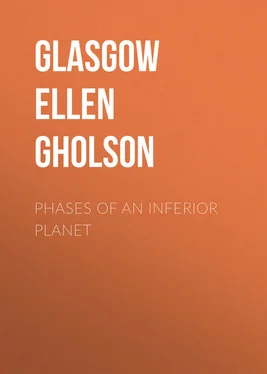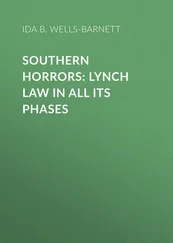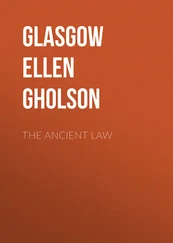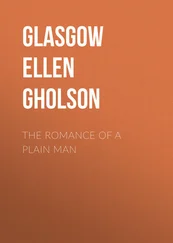Ellen Glasgow - Phases of an Inferior Planet
Здесь есть возможность читать онлайн «Ellen Glasgow - Phases of an Inferior Planet» — ознакомительный отрывок электронной книги совершенно бесплатно, а после прочтения отрывка купить полную версию. В некоторых случаях можно слушать аудио, скачать через торрент в формате fb2 и присутствует краткое содержание. Жанр: foreign_antique, foreign_prose, foreign_sf, на английском языке. Описание произведения, (предисловие) а так же отзывы посетителей доступны на портале библиотеки ЛибКат.
- Название:Phases of an Inferior Planet
- Автор:
- Жанр:
- Год:неизвестен
- ISBN:нет данных
- Рейтинг книги:4 / 5. Голосов: 1
-
Избранное:Добавить в избранное
- Отзывы:
-
Ваша оценка:
- 80
- 1
- 2
- 3
- 4
- 5
Phases of an Inferior Planet: краткое содержание, описание и аннотация
Предлагаем к чтению аннотацию, описание, краткое содержание или предисловие (зависит от того, что написал сам автор книги «Phases of an Inferior Planet»). Если вы не нашли необходимую информацию о книге — напишите в комментариях, мы постараемся отыскать её.
Phases of an Inferior Planet — читать онлайн ознакомительный отрывок
Ниже представлен текст книги, разбитый по страницам. Система сохранения места последней прочитанной страницы, позволяет с удобством читать онлайн бесплатно книгу «Phases of an Inferior Planet», без необходимости каждый раз заново искать на чём Вы остановились. Поставьте закладку, и сможете в любой момент перейти на страницу, на которой закончили чтение.
Интервал:
Закладка:
From without came the rumble of the elevated road and the shrill cries of a newsboy proclaiming the redundant virtues of the Evening Post . A warm August breeze, entering at the open window, which was raised from the floor, caused the flame of the lamp to flicker slightly. Outside upon the fire-escape the young plants were arranged in rows of systematic precision, their tender leaves revealed in the narrow path of lamplight leading from the heated room to the iron railing overlooking the street. With absent-minded elaboration the man drew an irregular line upon the paper before him. The line bore no relation whatever to the heading of the paper, which was written in a remarkably firm and heavy hand, and read:
Suddenly he laid the pen aside, and rose, wiping the moisture from his brow with his handkerchief. Then he threw off his coat and drew up his shirt-sleeves. It was oppressively warm, and the lamp seemed to possess the heating qualities of a Latrobe stove. For a couple of minutes he walked slowly up and down the uncarpeted floor. From the adjoining room came the sound of a piano and a woman singing. He shook his head impatiently, but the sound continued, and he yawned and stretched his arms with resentful resignation. After which he lifted the coffee-pot from the little stove and filled the cup upon the table.
Returning to his seat, he drank his coffee slowly, allowing his abstracted gaze to wander through the window and into the city night without. Upon the drawn shades of the opposite tenement-house he could trace the shadows of men and women passing to and fro like the unsubstantial outlines of figures remembered in a dream. His thoughts fluttered restlessly. He was tired. Yes, but the coffee would get him into shape again, and he must work. It was barely ten o'clock. The day had been trying. The experiments made in the college laboratory had been unsuccessful. He had gone about them wrongly. Professor Myers had been mistaken in his calculations. It was unfortunate. The opportunity for work had been excellent, and in September, when the session began, his lectures at that infernal Woman's College would take a good two hours daily, to say nothing of the preparations. What a bore it would be! If he had only money enough to follow out his work independently he might make a splendid success of it. True, he had spent enough on those travels and excavations in Egypt and Assyria to have supported an ordinary Philistine in comfort for an ordinary lifetime. But he did not regret them. They had given balance to his judgment, and he had acquired an immense amount of information. And those studies in Ancient India. Why, they had even more direct bearing upon his theories. Involuntarily his glance strayed round the book-lined walls and to the manuscripts in his desk. He devoured the closely written, almost illegible pages with insatiable eyes – eyes stricken with the mania for knowledge. The bronzed and sallow face he turned towards the light was suffused with the glow of a consuming purpose. In its deep-eyed, thin-lipped severity of drawing, every sensuous curve had been erased by lines of toil.
He set the cup aside and returned to his work. From a drawer of his desk he drew a thick volume, consisting of a number of legal-cap sheets, bound with a systematic regard for subject. Upon the cover was written in printed letters: "Notes," and beneath: "A History of Man, with Special Application of the Science of Ontogeny."
After consulting this briefly he laid it away and fell to writing. From the adjoining room still came the sound of a woman singing. The voice was light and flippant.
"Damn it!" said the man, suddenly, with angry impatience. He said it vehemently, looking up from his work with nervous irritability. At the same moment there came a slight tap at his door.
He laid aside his pen, rose, and opened it. Mr. Paul stood upon the outside.
"Well, Mr. Algarcife," he began, grimly, "you see I have broken a life-long principle and taken a man at his word. I came for the book you spoke of."
Algarcife welcomed him impatiently. "So I suppose I must prove your principle relative, if not erroneous," he answered. His voice was singularly full and clear. "It was Milligan on the Vocabulary of Aboriginal Tasmanians , was it not? Yes, I think it will aid you."
Mr. Paul came in and they sat down. Algarcife offered him coffee and cigars, but he declined. He sat stiffly in his chair and looked at the other with cynical interest.
"You write all night on this lye, I suppose?" he said, abruptly. "A combined production of brains and coffee."
Algarcife lighted his pipe and leaned back in his chair, blowing gray circles of smoke upon the atmosphere.
"You are right," he responded; "I find I do my best work after midnight, when I am drunk on caffeine or coffee. I suppose it will do for me in the end."
Mr. Paul returned his indifferent gaze with one of severity. "You are all nerves as it is," he said. "You haven't an ounce of good barbarian blood in your body – merely a colorless machine for ratiocination. I tell you, there is no bigger fool than the man who, because he possesses a few brains, forgets that he is an animal."
The other laughed abstractedly.
"What wholesome truths you deliver," he said. "I think Luther must have had your manner. Well, if I were in your place, I should probably say the same, though less forcibly. But they are theories. You see, I argue this way: with one man's mind and one man's power of work, I could never accomplish what I have before me – any more than poor Buckle, with the brain of a giant, could accomplish what he undertook. It is too big for a single man in this stage of development. So, with one man's mind, I intend to do six men's amount of labor. If I hold out, I will have my reward; if I go to pieces, I shall at least have the satisfaction of a good fight."
His voice was distinct and forcible, with a widely varied range of expression.
There was a second tap at the door, and Mr. Nevins entered, looking depressed and ill-humored.
"Hello, Anthony!" he called. "What! is Mr. Paul squandering your midnight oil? You should have sent him to bed long ago."
"It is not my hour for retiring," responded Mr. Paul.
Anthony interrupted pacifically.
"Mr. Paul is exhorting me," he said, "and I have no doubt that, with slight modifications, his sermon may be adapted to your case. He predicts brain-softening and general senility."
"An inspired prophecy," returned Mr. Nevins, crossly, "and savoring of Jeremiah. As for myself, it is but common justice that a man who has conscientiously refused the cultivation of the mind should not be called upon to lose what he doesn't possess." Then he grew suddenly cheerful. "Confound it! What's the use of being a philosopher on paper when you can be one in practice. What's the use of dying when you can eat, drink, and be merry?"
"Eating," remarked Mr. Paul, with depressing effect, "produces dyspepsia, drinking produces gout."
"And thought, paresis," added Anthony, lightly. "They are all merely different forms of dissipation. I have chosen mine; Nevins has chosen his. Only, as a matter of taste, I'd rather die by work than wine. Personally, I prefer consumption to apoplexy."
"There is such a thing as the means justifying the end," responded Mr. Nevins, in reckless ill-humor. "And it is a great principle. If I wasn't a fool, I'd make a bonfire of my brush and palette, and start afresh on a level with my appetite. I would become the apostle of good-living, which means fast living. I tell you, an hour of downright devilment is worth all the art since Adam. Aristippus is greater than Raphael."
"What has gone wrong?" demanded Algarcife, soothingly. "Too much purple in the 'Andromeda'? I always said that purple was the imperial color of his satanic majesty. If you had followed the orthodox art of your college days, and hadn't gone wandering after strange gods, you might have escaped a dash of that purple melancholia."
Читать дальшеИнтервал:
Закладка:
Похожие книги на «Phases of an Inferior Planet»
Представляем Вашему вниманию похожие книги на «Phases of an Inferior Planet» списком для выбора. Мы отобрали схожую по названию и смыслу литературу в надежде предоставить читателям больше вариантов отыскать новые, интересные, ещё непрочитанные произведения.
Обсуждение, отзывы о книге «Phases of an Inferior Planet» и просто собственные мнения читателей. Оставьте ваши комментарии, напишите, что Вы думаете о произведении, его смысле или главных героях. Укажите что конкретно понравилось, а что нет, и почему Вы так считаете.












